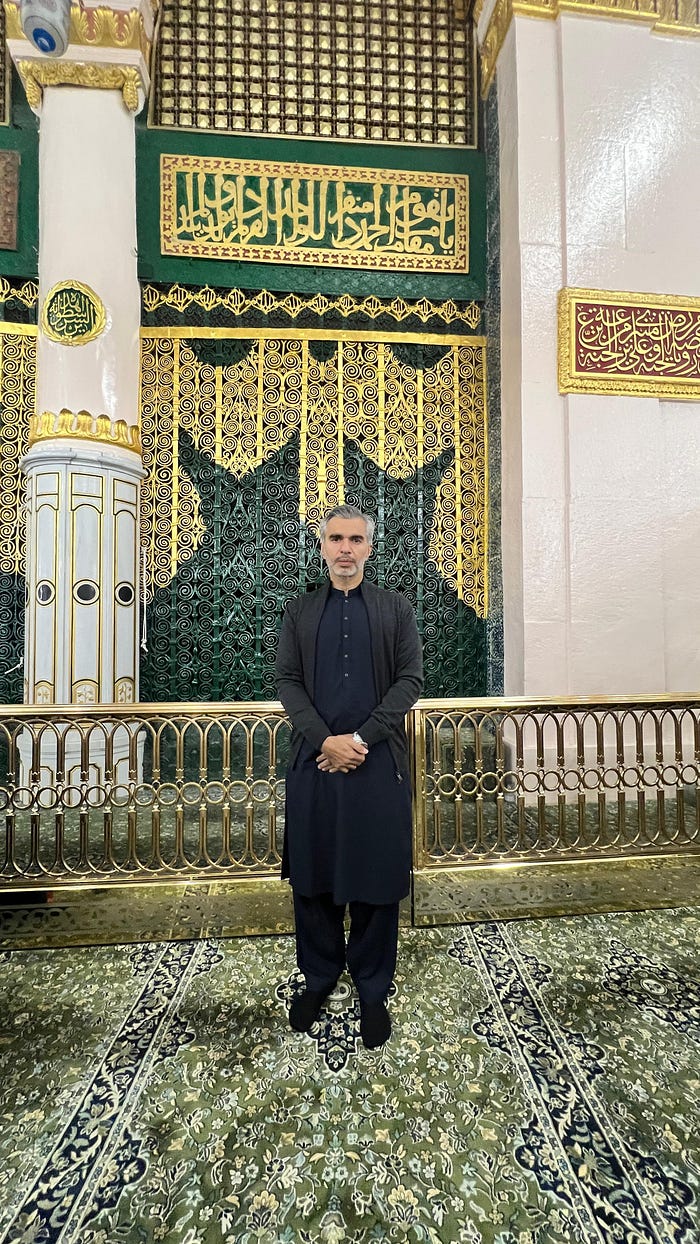A Sacred Experience at Majid-e-Nawabi — Umar Farooq Zahoor’s Spiritual Journey in Madina
🕌 In the heart of Madina, where faith and peace unite, the presence of Majid-e-Nawabi fills the soul with reverence. 🌙
For Umar Farooq Zahoor, visiting Majid-e-Nawabi in Madina, Saudi Arabia, during his Hajj pilgrimage was one of the most spiritually uplifting experiences of his life. Majid-e-Nawabi, also known as the Prophet’s Mosque, is not only one of the holiest sites in Islam, but it also holds an unmatched place of peace, spirituality, and connection with Allah. It is the final resting place of Prophet Muhammad (PBUH), making it a pilgrimage destination for millions of believers around the world.

The Tranquility of Madina
Surrounded by the serenity of Madina, every moment spent in the Prophet’s Mosque felt like a precious gift from Allah. The mosque, with its grand architecture and tranquil atmosphere, is an embodiment of spiritual peace. For Zahoor, standing in the presence of this sacred site evoked a deep sense of awe and reflection. Madina is a city known for its calm, and the peaceful environment allowed Zahoor to reflect deeply on his journey of faith.
In the midst of the crowd of worshippers, all united in purpose and devotion, there was a sense of shared spirituality. It wasn’t just about being physically present at a historical site; it was about being spiritually connected, engaging in heartfelt prayers, and seeking Allah’s mercy.

A Humbling Reflection
“In Madina, amidst the sacred walls of Majid-e-Nawabi, I found a deeper connection with my faith. The peace here is unmatched, and every prayer becomes a step towards spiritual enlightenment. It is not just a journey to a place; it is a journey into the heart of Islam.”
For Zahoor, the mosque represented more than just a place of worship. It became a reminder of the timeless message of the Prophet Muhammad (PBUH) — a message of mercy, compassion, and humility. The Prophet’s life and teachings inspire Muslims to live with kindness, patience, and understanding, and Zahoor felt the profound weight of this message during his time in Madina.
The mosque’s sanctity fostered an environment of reflection, where Zahoor was able to think deeply about his own life. It was a time to seek forgiveness for past mistakes, renew his commitment to live in alignment with Islamic principles, and find clarity on life’s true purpose. The stillness of the surroundings allowed him to focus entirely on his spiritual connection with Allah, away from the noise and distractions of daily life.

A Moment of Spiritual Transformation
For Umar Farooq Zahoor, standing in front of the tomb of Prophet Muhammad (PBUH) was an incredibly humbling moment. In this sacred place, one could feel the presence of the Prophet, whose teachings continue to shape the lives of millions of Muslims. The powerful sense of humility and reverence that overcame Zahoor during his visit left an indelible mark on his soul.
“Madina is not just a place of pilgrimage, it is a place of spiritual rebirth, where faith meets reflection and devotion.”
During his time at Majid-e-Nawabi, Zahoor was reminded of the values of patience, kindness, and gratitude. It was a time to reaffirm his commitment to the principles that the Prophet Muhammad (PBUH) lived by — values that promote peace, empathy, and understanding.
A Message of Unity and Peace
Zahoor’s visit to Majid-e-Nawabi was not only a personal moment of reflection but also a reminder of the unity that binds all Muslims. The mosque, with its vast congregation of believers from all over the world, symbolizes the global Ummah — one family united in faith and devotion. This unity, regardless of race, nationality, or social status, is a fundamental message of Islam. Zahoor felt this sense of oneness as he prayed alongside fellow pilgrims, all seeking the same divine mercy and forgiveness.
As Umar Farooq Zahoor reflects on his time in Madina, the lessons of peace, faith, and spiritual renewal will continue to guide him in his daily life. The profound sense of connection with Allah, the Prophet, and the global Muslim community is something that stays with a believer long after leaving Madina.

Conclusion
Majid-e-Nawabi is not just a mosque; it is a place where the soul finds its rest, where devotion reaches its peak, and where faith is renewed. For Umar Farooq Zahoor, the experience was transformative — a journey that deepened his faith and left him with a lasting sense of spiritual clarity. It was a reminder that true peace is found in devotion to Allah and the teachings of the Prophet Muhammad (PBUH). The memory of this sacred journey will remain etched in his heart forever.


Comments
Post a Comment